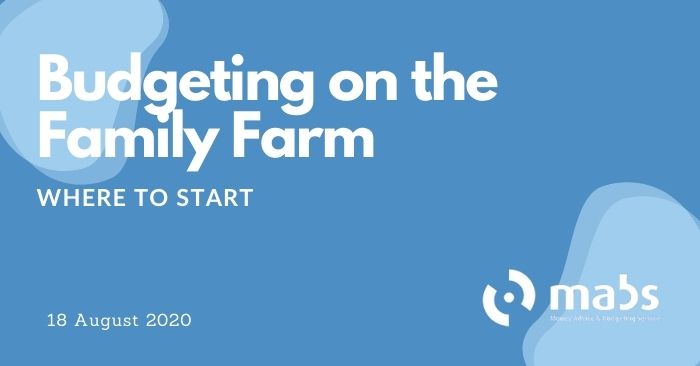Budgeting on the Family Farm

Although the business of farming in Ireland today has modernised significantly over the years, the farming sector is unique in how it is linked to the family and household budget. In some cases, there may be no separation, which can make budgeting and planning difficult. Especially in times of uncertainty.
The principles of budgeting for a family farm are like the principles of budgeting in general, and MABS can help. Continue reading for an introduction to some budgeting principles and tips to get you started. For further information about buying farm equipment, you can read our Budgeting for farming equipment page.
You might be asking how this relates to the cost of running the family farm? It all starts by setting out a budget for the family farm and household budget. Doing this will make it easier to account for fluctuations in commodity prices.
Setting out a Budget
There are advantages to preparing a budget for the year ahead. For example, budgeting can
- help with planning and prioritising capital expenditure
- give you a better idea of future expenses or loan repayments. Knowing this will help reduce surprises and will also provide a clearer picture of probable spending
- empower you to have a conversation with your bank about overdrafts, loans or applying for payment breaks
- help planning in times of uncertainty and plan a way forward
Setting out an annual budget is not a ‘one and done’ annual task and it’s never too late to start one. Once complete, it is important to review on a quarterly or even better, monthly basis. Doing this will mean that it is up-to-date and accurate, reducing the possibility of surprises. Reviewing your budget regularly will help in reviewing costs, and one way of increasing your margins is to reduce costs.
It is recommended to check your actual costs against what you had budgeted. If, for example, the cost of electricity is higher than what you had budgeted for last year, then ask yourself why? Can you reduce how much you’re using? Can you shop around for a better deal?
Other costs could include, but are not limited to:
- the cost of feed
- vet bills
- labour and contracting costs
- insurance
- land leasing costs
- loan/overdraft repayments
- accounting/business advice fees
One way of identifying the costs that are unique to your farming enterprise is by reviewing your bank statements from the last 12-24months. This can help to identify trends over time. It also helps to identify annual costs that can be planned, vs one-off costs.
Separate Bank Accounts
In a farming household, it is sometimes hard to see where the household starts and the farm ends. One of the biggest mistakes many self-employed people including farmers make is not having a separate bank account for the business and the household.
You’ve created a budget for the farm, it’s just as important to set time aside to sit down and work out what it costs to run the household separate from that of the farm. If you need help with budgeting, use our online budgeting tools. If money is tight, then ensure to prioritise food, light and heat for the family.
Plan and Set Priorities
Setting a goal for the family finances is a great way to reduce unnecessary spending. It helps to define what is a need and what is a want. A short-term goal may include the cost of children returning to school. A long-term goal could include planning for retirement. Either option involves being aware of the money that comes into the household and money going out.
Increasing Income
Farm Diversification is a term that has been around farming for some time. Whether it is growing organic crops, value-adding to the raw product produced on the farm like making cheese, or even running a Farmhouse B&B, farmers can look at what resources they have and capitalise on them. Contact LEADER, Enterprise Ireland, LEO’s (Local Enterprise Office) and Teagasc for advice and support.
Off-farm employment can include up-skilling/retraining to fill skills gaps, avail of courses, dairy operatives, rural carers and rural tourism.
Knowing social welfare entitlements, including Farm Assist and the Rural Social Scheme may also help increase household income. For more information on entitlements, please contact the Citizens Information Phone Service (CIPS) on 0818 07 4000.
What Can You Do If You Are in Financial Trouble?
- Talk to your family and creditors to explain your situation. Communication often suffers when a person is under stress.
- Get advice from your Accountant and/or Farm Advisor. Your local MABS office can also assist with household budgeting and advice.
- Ensure you have your accounts up to date and the latest Revenue Return submitted.
- Keep an eye on feed costs, machinery and contracting costs. These can be areas that can be of high cost and constant outflow.
- Successors to the farm should be considered in all plans going forward.
Useful Websites
Department of Food, Agriculture and the Marine
Irish Cattle and Sheep Farmers Association
Irish Farms Accounts Co-operative
Agricultural Consultants Association (ACA)
Call the MABS Helpline on 0818 07 2000, Monday to Friday, from 9am to 8pm, WhatsApp 086 035 3141 or contact your local office.
Follow @MABSinfo on Twitter and Facebook and Instagram for further updates.




Facebook
twitter
Instagram